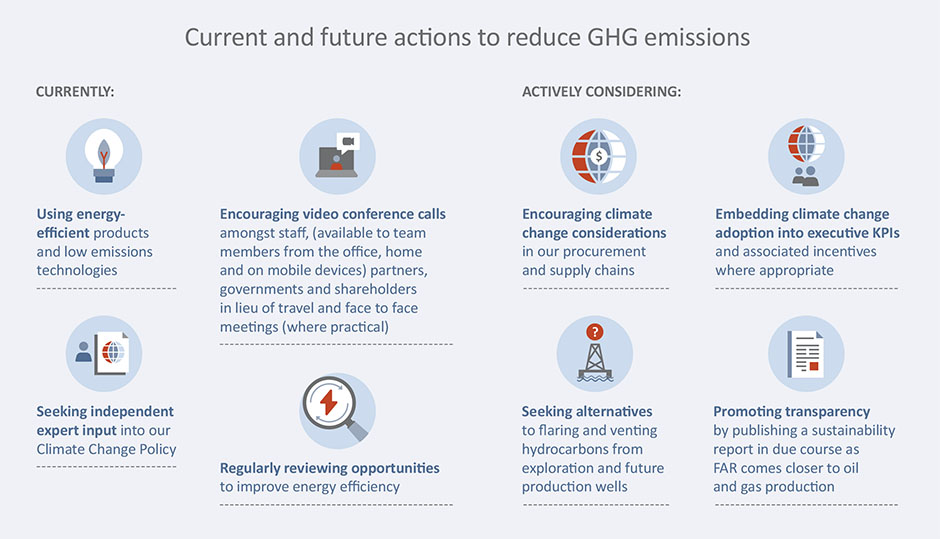
Environment and Climate Change
FAR recognises its responsibility to support greenhouse gas emissions reduction initiatives where it can. FAR supports host governments in their efforts to act on these emissions whilst maintaining a secure and affordable energy supply during a transition to a lower emissions future.
FAR acknowledges its own responsibilities in this context and its commitment to be part of a combined approach to a reduction in greenhouse gas emissions.
FAR acknowledges the Paris Agreement, which pledges to limit the rise in temperature to below two degrees Celsius and supports efforts to create a coordinated global emissions reduction process.
Climate-related Disclosure
Listed entities are encouraged to adopt the framework of the Financial Stability Board’s Taskforce on Climate-related Financial Disclosures (TCFD) to determine whether they have material exposure to climate change risk, and if so, to consider making disclosures recommended by the TCFD. The commentary adopts the TCFD’s schema of categorising risks as physical, or transitional. The commentary also encourages ‘entities that believe they do not have any material exposure to environmental or social risks to consider carefully their basis for that belief and to benchmark their disclosures in this regard against those made by their peers.
FAR is working towards implementing the recommendations of the TCFD. A number of climate-related disclosures are made below and in the Directors’ Report and FAR has expanded its climate related disclosure capability during 2021 to capture emissions related to the Bambo-1 well campaign. FAR intends to work with its joint venture partners, contractors and other stakeholders to further enhance climate-related disclosures.
Managing GHG emissions
In 2021 the Bambo well drilling campaign represented the most significant greenhouse gas (GHG) emission producing activity for the Group. FAR has worked closely with wells management contractor Exceed to deliver the Bambo wells as a carbon neutral drilling campaign. The project was planned and delivered using a strategy to firstly reduce direct emissions before offsetting residual emissions. The project is currently in the final assessment phase and emissions measurements and offsets are expected to be finalised in Q2 2022.
FAR’s commitment to make Bambo carbon neutral has been embraced by FAR’s co-venturer Petronas and major contractors to the well, Exceed, Stena and Schlumberger. Carbon offsets will meet international standards as certified by a reputable certification program. FAR has a history of working with host governments and joint venture partners to seek alternatives to flaring and venting hydrocarbons from exploration and future production wells, noting that flaring in most of the jurisdictions in which FAR operates is not permitted or highly restricted.
FAR’s sustainability and climate change policies can be found on the Company’s website at www.far.com.au

Assets, Reputation & Legal
The PEARL principle also informs FAR’s approach to managing its assets, reputation, legal obligations and risk generally.
FAR strives to undertake all of its activities to the highest possible technical and operational standards. FAR enjoys success in partnering with multinational partners in the oil industry and a number of host governments. FAR’s good reputation in the oil industry has been the foundation of this success and FAR works hard to ensure, through good governance, that our reputation remains strong. Further information on our risk management approach and assets can be found in the Directors Report and Operations Review.
Further information and our full Climate Change policy can be found here.